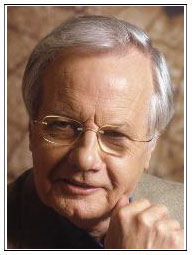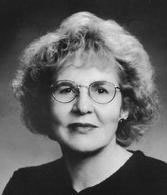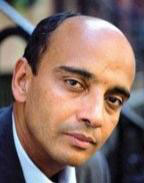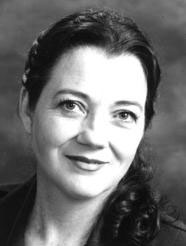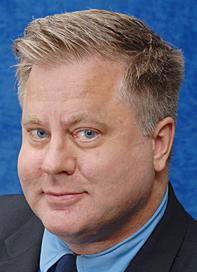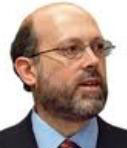“Talking About God” Bill
Moyers
Moyers: It's been a busy season for
God. Poor God, so many children, so little accord. So words have consequences and that reality has
implications for democracy. The writer Michael Lynne said, ‘Both Orthodox Christianity and Orthodox Islam
are intolerant religions which divide humanity into believers and infidels…humanist civilizations is
threatened today from both beyond its borders and from inside them’.” That is the actual prayer, in Arabic, found in the suitcase of one of the terrorists on September 11th. It’s the prayer of a devout human bomber. We talked about it with our guests. That’s the prayer of a suicide bomber. But isn’t that your prayer too? And my prayer. Haven’t all of prayed a prayer like that? And the question then is how is it that the God of comfort, hope and peace, prayed to by so many, becomes also the God of oppression, cruelty and injustice worshiped by others?” Jean Bethke
Elshtain (1943-2013)
Professor Elshtain: “You know if we have questions like ‘Why does religion seem to lead certain people into violence?’ If you accept the view that we’re fallen creatures and that there’s simply a human propensity to do sort of bad stuff and that every aspect of human history, whatever the religion or irreligion, every culture you look at, every society, you can see people committing horrors against one another, then the question is ‘Where do the remedies come from?’ ‘What can serve to chasten these tendencies?’ ‘What can correct them?’” Group : “Democracy!” Professor Elshtain: “And there we have democracy, but not democracy as an abstract set of procedures, but democracy as a culture and that culture of democracy, certainly in the United States, religion has play a very important part.” James A.
Haught
Mr. Haught: “In the real world of daily news and I see religion is basically an oppressive factor, where in the Bible belt of Appalachia there was a terrible uprising in my town against godless text books back in the 1970s. Mobs filled the streets and they shot people and they dynamited schools all because they somehow spread the rumor among fundamentalist churches that the new school books in this country system were godless. And all of us young rascals tried to read those books to find this dirty stuff in them; we couldn’t find any dirt at all, it was just plain old school books. So there’s a mindless component to religion as it functions in society that way. The fundamentalist preachers called a boycott of the schools; they had marches in the streets; the Klux Klux Klan came to support them. They threw dynamite into school doors and shot bullet holes into school buses. This one Minister and his followers decided they were going to teach a lesson to the families that were still driving their children to school, defying the boycott. They were going to wire dynamite caps in their gasoline tanks. So when the Mother or Father turned on the car to drive the kids to school it would blow up the car and burn them to death. Now that’s an extreme example, but that’s what religion out on the street and out in the common daily life of a community can turn into.” Professor Elshtain: “But you would accept there’s a difference vigorous advocacy and criminal behavior. I mean you’re talking about criminal behavior and I think to say that religion gives rise to vigorous advocacy is absolutely right, but that’s what we celebrate in a democracy: people strenuously arguing from points of view, stressing them, trying to urge their fellow citizens to sign on.” K. Anthony
Appiah
Professor Appiah: “The question is, ‘How in a democracy can we go to each other about the shared public world, given that we have difference views about what matters most deeply in the universe’. If we’re a democracy, if we’re a republic in which people are supposed to engage each other in order to create the public well together, then it seems to me, whatever actions actually motive our fellow citizens, whatever reasons they actually have for supporting things, I want to know.I think the question isn’t the content of what you say, it’s the manner. It’s can you have respect for discourse between people who have different views about things. And I think that it’s clear that you can and it’s clear that in some context it gets out of hand. When someone comes in sort of banging a particular text, very often what they’re trying to do is stop you having any further discussion. That’s I think what’s impermissible. And it seems to be me impermissible whether it comes from a Baptist, a Catholic or a self-styled atheist.”
Professor Murphy: “The violence of 9/11 can only be talked about in light of the authoritative text that our different religions come out of. And if those texts are being misinterpreted in order to paint Jesus as a violent man, and in fact, one of the translations of the cleansing of the temple is a bad translation, it says He made a whip of cords and He drove the money changers out. That is taken by countless Christians as exemplary, for their using violence in order to punish who are displeasing God. It is absolutely crucial to go back to those texts and read them right, and get the right reading out to the public.”
Professor Murphy: “That’s why I don’t believe that every Joe blow is equally competent to read the Bible.” Moyers: “And that’s why democracy is important - to make sure nobody can make that argument and impose it into law. It that the argument?” Mnawar
Anees
Dr. Anees: “In the contemporary sense I think that within the American society we have something like millions of Muslim immigrants. I see that as a great hope for the Muslim world. They are undergoing that experience – democracy. They are undergoing that experience of pluralism. They have established an economic base, a socio-economic strength that they have compared to the rest of the Muslims. It is very important for the American Muslims here that we as American Muslims try not to fall in the trap of radicalization of Islam.” Moyers: “But I can’t help as a
journalist, like Jim Haught, thinking as you talk of those young men from Buffalo, American born Muslims, who
went to Afghanistan, some of them to study in the camps where we are led to believe militant,
anti-American, anti-Semitic, anti-democratic ideas are taught and brought Professor Appiah: “But Timothy McVey was an American born something else, Christian of sort, I imagined.” Professor Elshtain: “But he didn’t claim religion; if fact he was anti-christian in the end.” Professor Appiah: “The point is, these are extremists. And one of the questions, there is a fair question, I think, for Islam and for the intellectual and moral leadership of the Muslim world, which there has been an unwillingness to address, critically, some of the developments within Islam that have created the world of the Taliban, of Wahabi forces supportive of Saudi regime. I think it’s a fair think to ask, just as it is fair to ask Christians to deal with the intolerance that’s preached in the name of Christianity, I think it’s fair to ask Muslims to deal with, to make the religious arguments that belong to their own tradition, to argue with their co-religionists or their alleged co-religionists, because we can’t do it. The only serious conversation that’s possible to these young men, given their Muslim framework, has to come from other Muslims.” Mr. Haught: “I think there’s an almost a rule of humanity that the more fervent religion is the trouble it causes.” Moyers: “William Penn said, ‘To be furious in religion, is to be furiously irreligious’”. Mr. Haught: “Most of the bloodshed around the planet is involved with religion one way or another. I mean Christians and Muslims are killing each other every day in the Sudan, in Indonesia, in Nigeria, in Azerbijan. And Catholics and Protestants kill each other in Ulster. Religious tribalism is a tremendous force in the world today and it splits communities into camps that start their own militias and pretty soon they’re at war.” Moyers: “Do you think this is a problem in the United States?” Mr. Haught: “It isn’t agnostics who are shooting people at abortion clinics. I think individual freedoms and liberty are imperiled when religion is too strong, and too strong a force, in any group. The most religious government in the world was the Taliban in Afghanistan. Do you think religion created morality in Afghanistan. “ Professor Appiah: “Probably the most religious government is in the Vatican. I don’t see the Vatican as posing great threats to the world survival of our species.” Professor Elshtain: “In the real world of American democracy, religious believers are more likely to be involved in a whole variety of ways in their communities. And activities that conduce to the common good that are not exclusively about their own religious bodies; they’re involved in all the various institutions of civil societies.” Professor Appiah: “Blaming religion or crediting religion is perhaps not the right to think about it. Some of the strongest defenders of gay rights in this country are religious people within Christian and Jewish traditions.” Moyers: “Liberal religions.” Professor Appiah: “Liberal, yes. The arguments between more liberal and more conservative ends of these religions are part of the texture of those religions. We can’t blame religion, Episcopalians for making New York too liberal or Boston to liberal. You can’t blame Baptist for making the South more homophobic. Within each of these traditions there are people making many kinds of arguments and, as there are, outside the traditions.” Professor Murphy: “I think the critical issue is whether you’re looking at genuine effects of religion per se, or you’re looking at the effects of people who already have an agenda, for good or for ill, using religion to support their cause and to stir up emotional backing for what they want to accomplish. It’s heartbreaking to me to hear stories about what Christians have done violently throughout their history because the whole point of Jesus’ teaching was to say you shall not take up arms against one another, you shall not damage one another, you’ll forgive your enemies, you’ll pray for those who persecute you. And the Christian church actually did a pretty good job at that for the first 300 years. It was only after Christianity became, first of all, the religion of the empire, then later became religions of the nations.” Moyers: “Religion joined politics.” Professor Murphy: “Yes. That’s right. And so then, you’ve got people who call themselves believers who are contributing mightily to the nastiness of the world, but the flip side of that is the religion itself is being ruined when it is being used for those purposes.” Moyers: “Let me ask Dr. Anees a question. Michael Lynne said, “Both Orthodox Christianity and orthodox Islam are intolerant religions which divide humanity into believers and infidels”. If that is the case, isn’t that threat to democracy?” Dr. Anees: “Bill, certainly, that if you take it literally it certainly is a threat to democracy in that sense where the worldview is established by a religious belief and a whole life is governed out of that – civil laws are based on that world view and so on. I think there is a tremendous amount of misunderstanding about what Islam stands for. What Iran talks about – the concept of God – what is the concept of God in Islam? And I do take exception to Franklin Graham’s comment that the God of Islam is not the God of Christianity. It is very much the same god in that sense that Islam proclaims itself to be a continuation of the message. And that concept, one of the fundamental positions within that concept of God is, that this is a God for all humankind.” Moyers: “But it is the Islam of Osama bin Laden that worries America just as it was the Christianity of the Ku Klux Klan that terrified blacks in the South.” Dr. Anees: “I would characterize it to be that, to say, your phrase, that it is Islama Osama bin Laden, I would say that it is not even Islama Osama bin Laden. I would be a misnomer to call it Islam, because what Osama bin Laden did is not permitted by any dictates of Islamic teaching.” Michael
Lind
Mr. Lind: “It seems to me we have a consensus that anytime any religious group does something that we consider wicked, therefore they misunderstood their own religion. I’m agnostic on this question. I don’t believe it when people say, that if a Christian blows of an abortion clinic, “well he’s misunderstood Christianity”. When a Muslim terrorist attacks some target, including a Muslim target, I not willing to say, as an outsider, that this is not a perfectly principled deduction from that religious belief.” Dr. Anees: “I think, Mike, in this case I would say it’s the exploitation in the name of the religion. It is not the teaching of that religion. It is not even the deduction of that religion.” Philip
Hamburger
Professor Hamburger: “Even if we concede his point, I think, even if we concede that someone blows up somebody else on the basis of religion, I think we should hesitate to go to the extent of saying, well therefore everyone else who’s religious or everyone else who’s Muslim or everyone else who’s Christian, necessarily shares deep attributes with the person who did the violent act. There is some danger from the extreme cases, that at least by implication, this is being attributed to everybody else. I think America, actually, is a remarkable model for the world precisely on account of our religious diversity. This is a place where in 18th century there was an understanding that people of many different religions, including religions other that Judaism and Christianity, can get along. It has been our religious diversity that has set the standard, not only for religious toleration across the globe, but also quite remarkably for our racial tolerance and our ability to come over other divisions.” Moyers: “That’s the past Phillip. What about now? In the aftermath of 9/11, in the aftermath of the heightened, intense concerns over the Islam of the Muslims.” Professor Hamburger: “We should stick to our traditions. There is not just one church out there that we’re afraid of, or one Muslim world we’re afraid of. I think that would be foolish. There are diversities within every tradition and many utterly peaceful people even within the religions that sometimes have people with excessive fervor.” Professor Elshtain: “Are there forces within religious traditions that can correct the kinds of horrors that your rightly jester for.” Professor Appiah: “There is a way of thinking about this which you can’t take from the inside. From the inside, says a Muslim, the question is, ‘what is the proper interpretation of my tradition’. Right? From that point of view you’ll be rightly critical of people who you think misunderstood, abused or simply taken advantage of a pretense of your religion. But there is a question I think you can ask from the outside, which is very important for us to think about in the context of American religious pluralism, which is if you look at what happens to religious communities as they settle in this country, over the last few hundred years, you get the sense that there is something that happens to most of them, a kind of Americanization. What happens it that when you come into the United States your tradition fits itself alongside other traditions, and those traditions include practices of toleration. I heard, the other day, three young Muslim American men talking, with no Muslim accent, and one of them said ‘what’s happened to me in the last year, I’ve come around to the view that this toleration thing is extremely important’, now these are smart people, I’m not trying to make them simple minded, ‘we may even have to be tolerant of homosexuals’. One of his friends said, ‘well maybe we don’t have to go that far.’ But the point is, that this is an American conversation, about three Muslims having an American conversation. I don’t think if they were living in their home country, I think it was Pakistan, they wouldn’t be having that conversation, because the context is different.” Professor Elshtain: “The story that came to mind comes from a woman from Uzbekistan who received a democracy award this summer from the National Endowment for Democracy. I was there present on the occasion. She described the centuries old traditions of toleration that characterized that region, where you had Jews, Christians, Muslims living with and among one another. And that this new variance on Islam she argued had much more to do with the history of communism, of bolshevism; of these ridged, now in this case atheistic ideologies, and their intolerance had much more to do with picking up on that and giving it a kind of Islamic flavor that had to do with anything intrinsic to Islam.” Moyers: “It is true, over time, and with great setbacks from time to time, America has taken the sharp edge off of religious extremism. The compromise that is at the heart of democratic politics has done that even in religious competition. In the last decade this democracy of ours has swelled with immigrants. Millions of people who brought their gods with them. And given what’s happening to democracy, should we leave on our currency in ‘god we trust’? And whose god is it?” Professor Appiah: “’In God we Trust’ is a statement which is of great significance to people who believe it. For people who don’t believe it, it’s a matter of indifference. So I don’t think is does any harm to the people who don’t believe it. I don’t think it’s worth getting much exercise out of it.” Professor Murphy: “There is too much of a tendency in this country to associate our Christian identities with our American identity. It’s like “my country, right or wrong, but it’s always right, because ‘in god we trust’”. But I feel equally strongly about taking all the American flags out of the churches. So that we don’t so easily confuse the Christian agenda with the national agenda.” Moyers: “Michael Lind do you believe that president Bush and his administration with the house and the senate in their axis will press a religious right agenda?” Mr. Lind: “I have no doubt it. The president owed his nomination to the religious right to defeat John McCain in the republican primaries. We have people like house majority Dick Armey who are Christian Scientist who say that Israel should expel the Palestinians. This is the most devout group, particularly Southern Protestants who have been in charge at the Federal level, but they’ve long existed at the state level. There’s nothing like this in American history. I think this is a very dangerous time in American politics. Traditionally there have been two powerful traditions in the United States. There’s the Enlightenment tradition and there the Protestant reformation tradition. Now the Protestant reformation tradition has been divided between the 19th century Evangelical Protestants in the north, social gospel Protestants, who were in favor of reforms like anti-slavery, feminism and things like that. So Enlightenment, liberalism and Protestant reformism worked together. This particular brand of Southern Protestantism, as you well know, sees the Enlightenment as the enemy. And it traces its own intellectual origins back to the Plymouth colony and the early Calvinists and thinks that Jefferson, Franklin and Washington were evil infidels and agnostics. So I think that there’s a growing divide in this country and in the interest of the ecumenical harmony, we shouldn’t paper over it.” Professor Appiah: “My own view is that I do not believe that the people who now run the Republican Party would be able to use our constitutional apparatus to impose on all of us. On the question of gay rights, I think the argument, even within the religious traditions, has shifted substantially and that again I think most Americans would see, including most people who identify with Christian rights, the impositions of exclusions on gays and teaching and so on as horrendously intolerant.” Moyers: “In a democracy isn’t acceptable for people to run for political office, putting their religious views out there?” Mr. Haught: “Oh, it’s mandatory (group laughs). In America every politician has to be right their standing up with Jesus. When Bill Clinton was in trouble with Hillary, he trotted to church with a Bible tucked under his arm. Any politician who admitted any doubt of the dominate faith, he would lose, that would be the end of it.” Moyers: “Is it your belief Jim Haught that any God talk is a threat to Islam?” Mr. Haught: “It’s pandering and self-serving and political posturing. We have a big prayer breakfast for the state government in West Virginia every year. One year the chief leaders were the governor and the senate president and the visiting congressman. In two years later all three were in federal prison. And I always thought there goes your pious, pompous, posing Christianity that is so essential in politics.” Moyers: “What do you think would happen to any candidate for the president who today emulated Theodore Roosevelt who of spoke of Americans using natural history on my experience with naturalism, the topic of his article and his lecture. What do you think would happen to somebody who stood up and said, ‘I’m a naturalist, I’m an evolutionist, I may even be an atheist, at least an agnostic, and I’m going to run for the president of the United States’?” Professor Appiah: “Clearly he wouldn’t be taken seriously and I think that is a problem.” Professor Hamburger: “I would suspect he would be taken seriously on the account of his prose. And to the extent our politicians are willing to talk capably about their belief, they get all the more respect. So I actually do not think you would necessarily be as much of a problem, but it is grounds for concern.” Mr. Haught: “I think if valid skeptic would get two percent of the votes he’d be overwhelming rejected by the American people.” Moyers: “I did an interview a number of years ago with your colleague, the scholar of religion Elaine Pagles, and she said there’s practically no religion I know of that sees other people in a way that affirms the other’s choice. That is the nature of religion, is it not? Not to affirm the other’s choice. If my truth is true, can your truth be true?” Mr. Lind: “True or false: ‘Jesus is God’. True or false? That’s a truth statement, the foundation of most Christian belief. Muslims believe that Jesus was a prophet, therefore this truth statement is false. Now we’re all saying we should all engage, we should all debate. Well here’s my idea of Christian-Muslim conversation: Jesus is God, accept him. Muslim: no he was a prophet, we’ll honor him, but we won’t worship him, because that’s blasphemy. Beyond that I don’t see much prospect for theological exchange.” Moyers: “Are we 'One Nation under God' as you see it by that definition? As it says on our coin.” Dr. Anees: “Yes. There is an instinct in all human being, in all races, that there is some sort of religiosity that resides in us. The American experience of religious pluralism and democracy, that mixture has historically been proven to be unique anywhere in the world. Given that, I think we should leave that on our currency, saying ‘God we Trust’ or ‘One Nation under God’. For the simple reason that I see it as convergence of democratic governance, pluralism, and a free expression of very inner code of human religiosity.” Professor Appiah: “If we don’t talk to each about these things people will go off in a corner and form as large of a group as they can and try to push the agenda their way. What we should be doing is having dialog with each other.” Professor Elshtain: “But I think, to think of that moving prayer, and then to think of the horror of people who were prepared to intentionally target and murder innocents in the name of their religion, suggest that we need to think about is what they are all bringing to bear in order to make that prayer work with that intention and that action. And I think there we simply cannot rule out the fact that these are people functioning in the beginning of the 21st century with a century behind them of murderous, totalizing anti-religious ideologies, that offered these comprehensive worldviews, but in fact didn’t have any of the virtues of the pluralism and the tolerance, that we’re talking about, as intrinsically connected to democracy in which, certainly the American democracy, religious belief, religious faith and religious institutions have played a central part.” Moyers: “Each of you has made an important contribution and I thank you very much for both your time and your ideas.”
|
